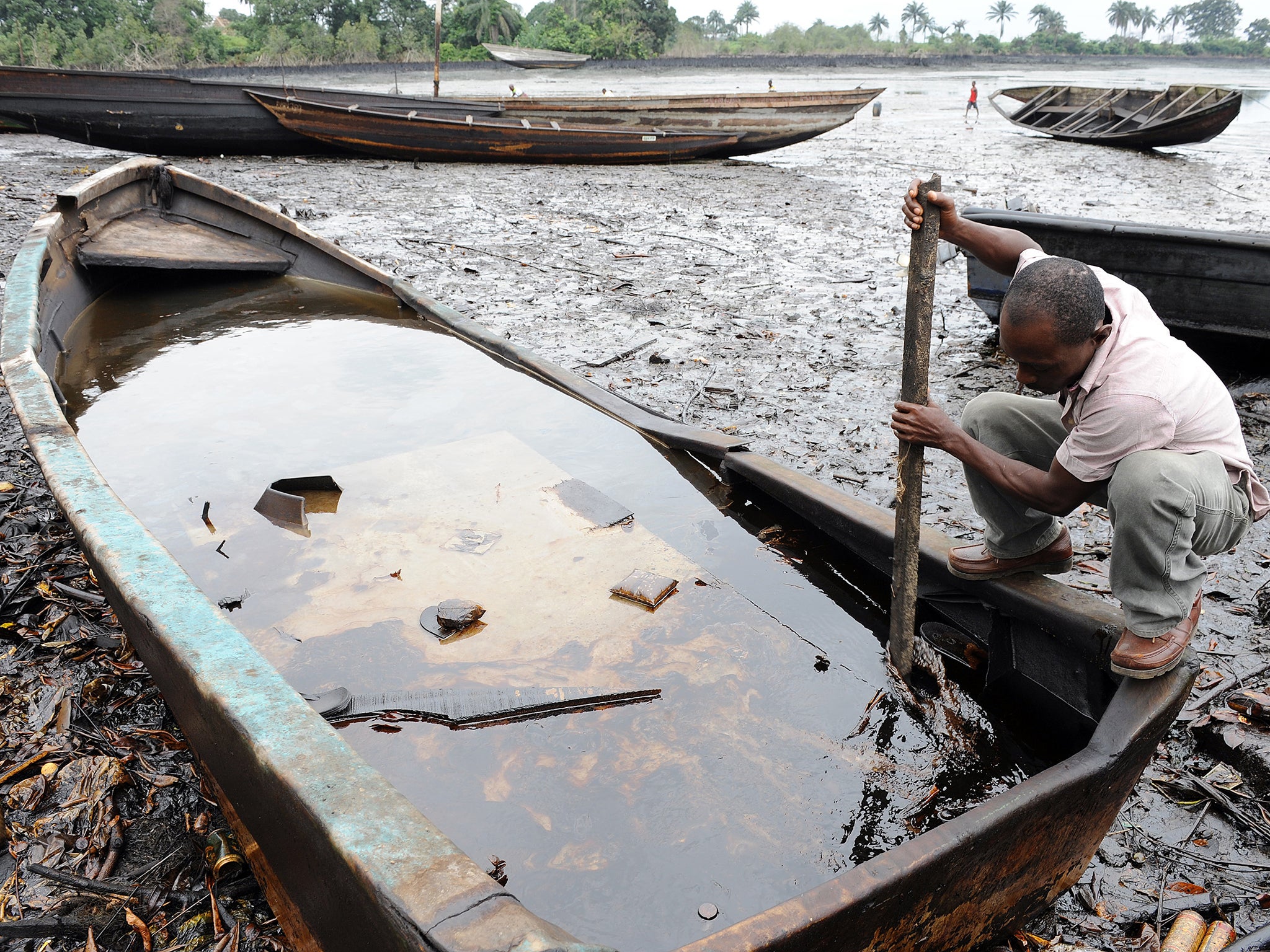Shell accused of concealing data on the health effects of two major oil spills on Nigerian communities
In a letter seen by The Independent, Kay Holtzmann called for a 'medical mass screening' of the entire Bodo community

A whistleblower has accused oil giant Shell of concealing data on the health effects of two major oil spills on communities in Nigeria.
In a letter seen by the Independent, Kay Holtzmann, a former employee at the company, said data gathered in the Bodo community which was devastated by two huge oil spills in 2008 and 2009, showed levels of pollution were “astonishingly high”.
He also accused the company of refusing to make the findings public.
Mr Holtzmann was the former director in charge of Shell’s project to clean up oil spills in the Bodo community, which is located in the oil-producing Niger Delta region.
His letter said the clean-up project carried out an analysis of the environment in the Bodo creeks in August 2015 “against fierce opposition” from Shell's subsidiary company in Nigeria known as Shell Petroleum Development Company of Nigeria (SPDC).
The findings were allegedly so striking that Mr Holtzmann concluded the long term effects of people’s health are “unpredictable” and called for emergency health measures be put in place in the Bodo community.
He wrote: “The results from the laboratory were astonishingly high, actually the soil in the mangroves is literally soaked with hydrocarbons. Whoever is walking in the creeks cannot avoid contact with toxic substances.
“Although the locals are accustomed to their environment they are exposed to hazards and especially negative long term effects on their health are unpredictable."
The letter was addressed to the chairman of the Bodo Mediation Initiative, which is sponsored by the Dutch Government and is tasked to ensure the clean-up is done to international standards.
Copies were also sent to the executive director of the United Nations Environmental Programme (UNEP) Eric Solheim, the Dutch Ambassador to Nigeria and Shell.
Shell accepted liability for the 2008 and 2009 oil spills, which devastated the fishing community's environment and destroyed its livelihood.
In 2011, UNEP published a damning report anticipating it would take up to 30 years to clean the Niger Delta from oil spills, caused by theft and operational failures.
In 2015, the company agreed to pay £55m to the Bodo community for losses caused by the spills.
Mr Holtzmann called for “immediate action to protect the health of the Bodo residents” and urged for “medical mass screening” to take place warning against the risk for people exposed to toxic substances by bathing or drinking the polluted water.
Daniel Leader, partner at law firm Leigh Day who is representing the Bodo Community, told the Independent: “The Bodo Community was subjected to two devastating oil spills due to faults on Shell’s pipelines in 2008. These spills led to the largest loss of mangrove habitat in the history of oil spills and ruined Bodo’s environment and way of life.
“The community sits on the pollution site, when they open their front door it’s a sea of oil. From 2008 to 2017, there has been no clean-up, no health testing, no water supply testing, nothing.
"This letter shows that even those who were employed by Shell are deeply concerned by their behaviour and their lack of transparency. The data that has been uncovered is very serious and leads to real concerns about the potential impact of the health of the Bodo community.
“The communities are fed-up, they have been waiting and waiting. Nigeria is not getting the attention it deserves from Shell. Shell must act now.”
In the letter, Mr Holtzmann writes that he asked SPDC to publish the group’s findings, which he believes are in the public interest, but received a flat refusal from Shell.
He claims that Dr Philip Shekwolo, of SPDC, replied: “I have made enquiries about your plan to make a publication on Bodo clean-up project, and I am told that you are not permitted to make any publication on Bodo creek clean-up project. The contract you had with Bodo mediation Committee did not permit you to make any publication.“
Mr Holtzmann slammed Shell’s behaviour as “irresponsible" and said the company has “no right to conceal important data”, however unpleasant.
Law firm Leigh Day said it wrote to Shell urging disclosure of the data and for the necessary health screening measures to be put in place without delay but it received no response.
A spokesman for SPDC said: "The remediation of the Bodo Creeks is managed by the Bodo Mediation Initiative (BMI) which includes representatives from the Bodo community, SPDC, Nigerian government, Dutch Embassy and other stakeholders.
“The environmental assessment was conducted under the auspices of the BMI and accordingly, all questions relating to this work are best directed to the BMI. SPDC remains fully committed to ensuring clean-up takes place and will continue to work with the BMI to implement a remediation plan for Bodo area."
In a statement the Bodo Mediation Initiative said the data collected was "worrisome but not enormously surprising" and was described as "not different from existing observations from earlier reports", which therefore "did not warrant immediate emergency measures".
No-one could explain the decision to withhold the data from the public.
Chairman of the BMI Inemo Samiama said: "The environment is still polluted. Ultimately, if the clean-up is done, then they will no longer be fears about the impact on the health of these communities."
Join our commenting forum
Join thought-provoking conversations, follow other Independent readers and see their replies
Comments
Bookmark popover
Removed from bookmarks